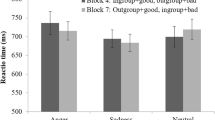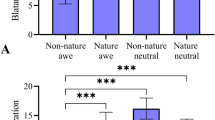Abstract
Purpose
Emotions form an important part of stereotyping and prejudice, but little is known about how intergroup emotions are associated with anti-fat prejudice. This study examined the relation between negative intergroup emotions (disgust, contempt, and anger) and the stereotypes of obese people.
Method
A community sample (n = 380) and an undergraduate sample (n = 96) rated obese people on common obesity stereotypes (e.g., lazy, sloppy), and also indicated the extent to which they felt disgust, contempt, and anger toward obese people.
Results
In both samples, participants reported feeling more disgust and contempt than anger toward obese people. Furthermore, regression analyses indicated that disgust was a significant positive predictor of obesity stereotypes, but contempt and anger were not.
Conclusion
Overall, these findings provide further evidence that disgust plays an important role in prejudice toward obese people.
Similar content being viewed by others
References
Puhl R, Brownell KD (2001) Bias, discrimination, and obesity. Obes Res 9:788–805
Schwartz MB, Vartanian LR, Nosek BA, Brownell KD (2006) The influence of one’s own body weight on implicit and explicit anti-fat bias. Obesity 14:440–447
Vartanian LR, Silverstein KM (2013) Obesity as a status cue: perceived social status and the stereotypes of obese individuals. J Appl Soc Psychol 43:E319–E328
Latner JD, O’Brien KS, Durso LE, Brinkman LA, MacDonald T (2008) Weighing obesity stigma: the relative strength of different forms of bias. Int J Obes 32:1145–1152
Vartanian LR (2010) Disgust and perceived control in attitudes toward obese people. Int J Obes 34:1302–1307
Latner JD, Stunkard AJ (2003) Getting worse: the stigmatization of obese children. Obes Res 11:452–456
Dovidio JF, Brigham JC, Johnson BT, Gaertner SL (1996) Stereotyping, prejudice, and discrimination: another look. In: Macrae N, Hewstone M, Stangor C (eds) Stereotypes and stereotyping. Guilford Press, New York, pp 276–319
Iyer A, Leach CW (2008) Emotion in inter-group relations. Eur Rev Soc Psycho 19:86–125
Krendl AC, Macrae NC, Kelley WM, Fugelsang JA, Heatherton TF (2006) The good, the bad, and the ugly: an fMRI investigation of the functional anatomic correlates of stigma. Soc Neurosci 1:5–15
Park JH, Schaller M, Crandall CS (2007) Pathogen-avoidance mechanisms and the stigmatization of obese people. Evol Hum Behav 28:410–414
Rozin P, Lowery L, Imada S, Haidt J (1999) The CAD triad hypothesis: a mapping between three moral emotions (contempt, anger, disgust) and the moral codes (community, autonomy, divinity). J Pers Soc Psychol 76:574–586
Hutcherson CA, Gross JJ (2011) The moral emotions: a social-functionalist account of anger, disgust, and contempt. J Pers Soc Psychol 100:719–737
Mackie DM, Devos T, Smith ER (2000) Intergroup emotions: explaining offensive action tendencies in an intergroup context. J Pers Soc Psychol 79:602–616
Cottrell CA, Neuberg SL (2005) Different emotional reactions to different groups: a sociofunctional threat-based approach to prejudice. J Pers Soc Psychol 88:770–789
Dasgupta N, DeSteno D, Williams LA, Hunsinger M (2009) Fanning the flames of prejudice: the influence of specific incidental emotions on implicit prejudice. Emotion 9:585–591
Elfenbein HA, Ambaby N (2002) On the universality and cultural specificity of emotion recognition: a meta-analysis. Psychol Bul 128:203–235
Tracy JL, Robins RW (2008) The automaticity of emotion recognition. Emotion 8:81–95
Haidt J (2003) The moral emotions. In: Davidson RJ, Scherer KR, Goldsmith HH (eds) Handbook of affective sciences. Oxford University Press, Oxford, pp 852–870
Teachman BA, Gapinski KD, Brownell KD, Rawlins M, Jeyaram S (2003) Demonstrations of implicit anti-fat bias: the impact of providing causal information and evoking empathy. Health Psychol 22:68–78
Anesbury T, Tiggemann M (2000) An attempt to reduce negative stereotyping of obesity in children by changing controllability beliefs. Health Educ Res 15:145–152
Russell PS, Giner-Sorolla R (2011) Moral anger is more flexible than moral disgust. Soc Psychol Personal Sci 2:360–364
Russell PS, Giner-Sorolla R (2011) Moral anger, but not moral disgust, responds to intentionality. Emotion 11:233–240
Russell PS, Giner-Sorolla R (2011) Social justifications for moral emotions: when reasons for disgust are less elaborated than for anger. Emotion 11:637–646
Oaten M, Stevenson RJ, Case TI (2009) Disgust as a disease-avoidance mechanism. Psychol Bul 135:303–321
Acknowledgments
Preparation of this article was supported under Australian Research Council’s Discovery Projects funding scheme (project number DP130100759).
Conflict of interest
On behalf of all authors, the corresponding author states that there is no conflict of interest.
Author information
Authors and Affiliations
Corresponding author
Rights and permissions
About this article
Cite this article
Vartanian, L.R., Thomas, M.A. & Vanman, E.J. Disgust, contempt, and anger and the stereotypes of obese people. Eat Weight Disord 18, 377–382 (2013). https://doi.org/10.1007/s40519-013-0067-2
Received:
Accepted:
Published:
Issue Date:
DOI: https://doi.org/10.1007/s40519-013-0067-2




